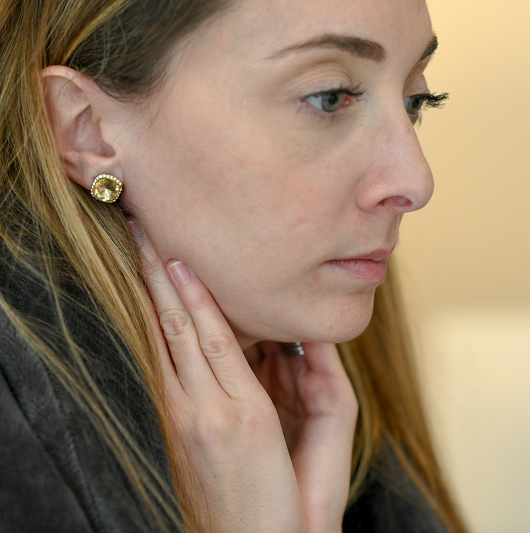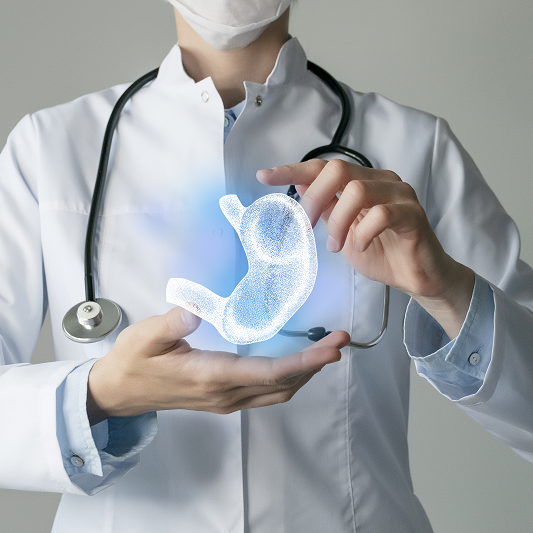Gastroenterology at Hackensack
Meridian Health
Meridian Health


Motility disorders are conditions characterized by abnormal disruptions in the regular movement of food and waste through the digestive tract. This disruption can lead to variations in the speed of movement, with food either moving slower or faster than the norm. Additionally, it can result in the improper movement of food in directions it shouldn't go.
Find a gastroenterologist in New Jersey, motility disorder care location, learn more about why you should choose Hackensack Meridian Health, or view all of our gastrointestinal services and the conditions we treat across the state of New Jersey.
Physicians generally categorize the digestive tract into two main sections: the upper and lower parts. The upper digestive tract comprises the esophagus and stomach, whereas the lower portion encompasses the intestines.
Motility disorders that affect the upper digestive tract consist of:
Motility disorders that impact the lower digestive tract include:
You may have a motility disorder if you have the following symptoms:
Our comprehensive diagnostic approach includes several specialized tests and advanced therapeutic endoscopic procedures available throughout our New Jersey hospitals and care centers.
High-Resolution Esophageal Manometry Studies with Impedance Technology: Using a thin catheter inserted through your nose into your esophagus, we conduct high-resolution esophageal manometry studies. This test accurately measures the contractions of your esophageal muscles, assessing their strength, coordination, and the movement of food through your digestive tract.
Ambulatory pH Wireless Study (Acid Reflux Testing): As part of a routine endoscopy, we utilize a disposable wireless capsule that is placed on the lining of your esophagus. This capsule continuously measures pH levels for a period of 48 hours. The collected data about the acid in your esophagus is transmitted to a small computer. Once the study is complete, the capsule naturally passes through your stool under the supervision of New Jersey-based gastroenterologists.
Endolumenal Functional Lumen Imaging Probe: To diagnose esophageal motility disorders, such as achalasia, we offer a minimally invasive test. During an endoscopy, a catheter with a balloon is inserted into your esophagus. The balloon receives mild electrical impulses, allowing us to assess how effectively your esophagus swallows food at our Hackensack Meridian Health motility centers in New Jersey.
Gastrointestinal Transit: To assess the functioning of your gastrointestinal (GI) tract, we measure the rate at which material passes through your stomach, intestines, and rectum. This can be achieved using a wireless smart pill capsule, scintigraphy, or radiopaque markers. These methods provide valuable insights into the transit time of your GI tract.
High-Resolution Anorectal Manometry and Balloon Expulsion Test: This comprehensive test evaluates the sensation, strength, and coordination of your rectum during bowel movements (evacuation). By assessing the causes of evacuation disorders and bowel incontinence, we gain valuable insights into your condition.
Our range of advanced diagnostic tests enables us to gain precise insights into your condition, leading to tailored treatment plans that address your specific needs throughout New Jersey.
Adopting a healthy diet and implementing small adjustments to your eating habits can be beneficial in managing various motility disorders. Your gastroenterologist in New Jersey, will guide you in determining the most suitable diet for your condition and may refer you to a dietitian who can provide further assistance in making healthy changes.
A motility diet typically includes:
It's important to note that individuals with motility disorders generally benefit from avoiding high-fiber foods, unless instructed otherwise by your health care provider. However, if you have hard-to-treat constipation or your health care provider specifically recommends increasing your fiber intake, you may include more fiber-rich foods in your diet.
Traditional treatment options for motility disorders, such as medications like Botox and endoscopic techniques like dilation, may provide temporary relief, but symptoms often return. For long-term relief, surgery is recommended.
Minimally invasive surgery: At our Gastroesophageal Reflux and Motility Program, we specialize in minimally invasive surgical techniques to address certain motility disorders. Our approach involves surgically dividing the lower esophageal sphincter muscle, allowing food to pass more easily into the stomach.
Robotic Heller Myotomy: One commonly used minimally invasive technique is robotic Heller myotomy (LHM). This procedure is performed through several small incisions in the abdomen. Using a camera for guidance, we carefully divide the sphincter muscle. The small incisions typically heal well and are barely noticeable a few weeks after the procedure when performed at our advanced surgical centers across New Jersey.
Our minimally invasive surgical techniques for motility disorder provide effective, long-term relief, allowing you to experience improved swallowing and digestion.
Schedule an appointment online with a gastroenterologist or call us at 855-HMH-WELL if you experience recurrent or chronic digestive problems, such as:
Gastroesophageal Reflux and Motility Program
JFK University Medical Center
65 James Street, Edison, NJ 08820
732-346-5400



